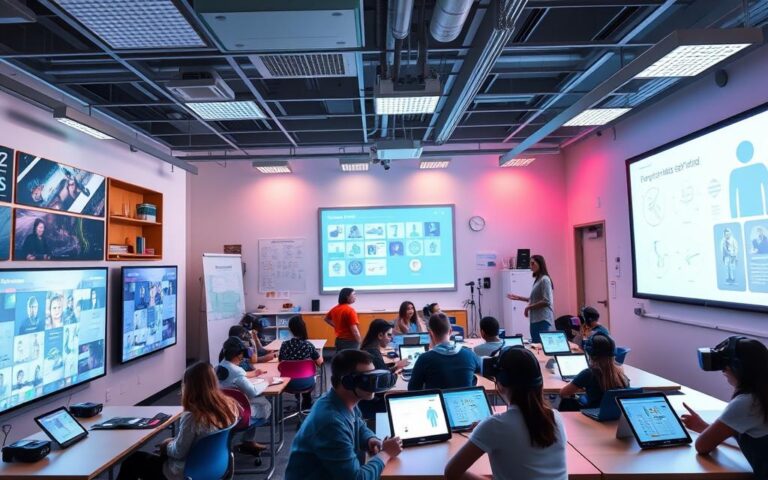Practical Uses of Information Technology
Information Technology (IT) plays a big role in our everyday lives. It shapes many sectors, including healthcare, education, and business. IT changes the way we talk to each other, learn new things, and run companies. Most businesses use advanced IT to work better, stay competitive, and offer good service.
Since 1958, when we first started talking about IT, it has grown a lot. We’ve moved from simple tools to using the cloud and mobile technology. These tools help us work smarter and save time. For instance, the cloud software market is expected to reach 232 billion USD by 2024. Businesses use cloud services to handle their work more efficiently.
Also, IT is essential for things like chatting online, banking, and looking after patients. Automated systems make work easier and let us get information fast. This helps us make quick decisions. For more info on IT, check out this resource.
Understanding the Role of Information Technology in Daily Life
Information technology plays a big part in our daily lives now. It has changed how we talk, learn, and get medical care. This change shows how tech makes things better and easier in many areas. It helps us to do things faster and talk better.
Enhancing Communication
Information technology has changed how we talk to each other. With the internet, we can talk to someone far away instantly. We can share news without worrying about language or how far apart we are. This has improved friendships and work relationships, making the world feel closer.
Transforming Education
Technology has changed education too. Now, we can use the internet to get to learning materials anytime. This means people can learn from anywhere using tablets or computers. It helps everyone keep learning their whole lives and helps students do better in school.
Revolutionising Healthcare
Technology has also changed healthcare for the better. Doctors can talk to patients quickly using online tools. This is really important in emergencies. It also makes the paperwork easier, so doctors can spend more time caring for patients.
How Do You Use Information Technology to Optimise Productivity?
Using information technology wisely can boost productivity in different areas. This means adopting advanced tools and methods to make work smoother and more efficient. Two key factors are automating tasks and managing data well, which help reach company goals.
Workplace Automation
Workplace automation uses tech to do repetitive tasks, freeing up staff for more important work. For example, Business Intelligence (BI) tools like Power BI and Tableau use AI to analyse data. This helps teams make quick, accurate decisions.
- Automation tools can improve time efficiency by managing mundane tasks.
- Cloud-based collaboration platforms streamline communication within distributed workforces.
- Project management software helps in tracking tasks, deadlines, and project stages effectively.
Such tech not only makes teams more productive but also boosts morale. Employees feel more involved and valued in a supportive work environment.
Data Management Tools
Data management is key to using IT for better productivity. These tools help gather and analyse data effectively, giving insights to improve performance. CRM software, for instance, makes sales smoother and improves customer service. This helps manage customer relationships well and fix issues fast.
“Tracking productivity through data collection is essential to determine the impact of new technology.”
Cloud storage keeps data safe and accessible from anywhere. This allows staff to work remotely without risk. Having the right tools and expertise ensures productivity is measured and improved over time. This encourages ongoing innovation.
Information Technology in Business and Commerce
Information technology has changed how businesses work and talk to their customers. It has improved online banking and helped businesses enter online markets. By using cloud technology, IT has become key to growth and efficiency.
Online Banking and Financial Services
Online banking has reshaped the financial world. Now, customers can easily do transactions and manage their money online. This change means banks can work more effectively and save money, offering better service.
e-Commerce Growth
The rise of e-commerce has created new opportunities for businesses. By using digital marketing, businesses can reach more customers. This leads to more sales. Analysing data helps them understand customers better and improve their strategies.
Adoption of Cloud Services
Cloud technology lets businesses cut costs and work more smoothly. It offers flexible plans that change as businesses grow. Cloud services also make it easier for teams to work together from anywhere. They keep data safe too, which is very important for banks.

| Aspect | Traditional Approach | With IT Integration |
|---|---|---|
| Cost Efficiency | High infrastructure costs | Reduced operational costs through online banking and cloud services |
| Customer Reach | Limited to local clientele | Global audience access via e-commerce |
| Security | Physical security measures | Advanced cybersecurity protocols in IT systems |
| Productivity | Manual processes | Automated solutions and managed IT services |
Using information technology in business lowers the risk of security problems. It also makes businesses more efficient and flexible. By being innovative, companies can stay ahead in a tough market.
The Impact of Information Technology on Employment Opportunities
Information Technology has greatly changed job landscapes, bringing new roles and changing the skills needed. Because technology evolves quickly, the link between IT and jobs is more relevant than ever.
Emergence of New Job Roles
Since 1940, over 60% of new jobs are due to technology. Fields like industrial engineering and operations research have grown. This shows how job skills must evolve, pushing for continual learning and adaptability.
Changing Skill Requirements in the Workforce
Automation is changing what skills employees need. There’s a higher demand for educated workers in roles that didn’t exist before. Over 25 million jobs might be automated soon, showing the need for new skills.
Organisations want employees skilled in technology and their industry demands. Jobs have evolved, creating new opportunities. This requires using innovative tools and techniques. Modern presentation technologies help improve communication and teamwork, key for success in this changing field.
| Job Role | Trend | Impact Timeframe |
|---|---|---|
| Industrial Engineers | Growing Demand | 1980-2018 |
| Operations Researchers | Growing Demand | 1980-2018 |
| Cabinetmakers | Thinning Due to Automation | 1980-2018 |
| Shipping Clerks | Increased Demand | 1940-Present |
The future is challenging because of technological progress. Both companies and workers must adapt. They should learn new skills to succeed in new tech jobs.
Conclusion
Information technology has a huge impact on our lives today. It has improved how we communicate, learn, and get medical care. The conclusion on information technology uses shows us looking forward to IT making even more improvements in different areas. It also plays a key role in making jobs and growing businesses.
As our world becomes more digital, understanding IT is more important than before. Innovations like self-driving cars and big data can save lives and create new chances for businesses. But, we must also consider the challenges like inequality and fewer jobs. So, putting money into IT and research in various fields is key to make the most of it while reducing the bad effects.
The path IT will take depends on the choices we make and the actions we take now. Using new tech for education or cloud computing for managing data is crucial. Adapting to IT is vital for both our personal and professional success. For more detailed information on how IT is changing, check out this resource.
FAQ
What is the role of Information Technology in modern society?
IT is very important in today’s world. It touches healthcare, education, business, and how we talk to each other. It makes things run better, helps companies compete, and makes getting things done easier.
How does Information Technology enhance communication?
IT helps us talk to each other better. With email, instant messaging, and video calls, we can connect easily. This is true no matter where we are in the world.
In what ways has Information Technology transformed education?
IT has changed how we learn. Now, we have online classes, virtual schools, and learning apps. This makes studying more flexible and personal for everyone.
How has IT revolutionised healthcare?
IT has changed healthcare a lot. We now have electronic health records, telemedicine, and apps to manage health. This means better patient care, improved data handling, and easier communication for doctors.
What are some tools for optimising productivity with Information Technology?
To be more productive with IT, we use tools like automation software, project managers, and data technologies. These help teams work better together and make tasks easier.
How does Information Technology impact online banking and financial services?
IT has changed banking and finance by making it safe to do transactions online, letting us watch our money in real time, and letting us access banking services from anywhere. This makes things very convenient for users.
What are some current trends in e-commerce due to Information Technology?
In e-commerce, IT brings us mobile shopping, shopping experiences that feel personal, and easy payment methods. These changes help businesses connect with customers better and increase sales.
How has cloud technology influenced business operations?
Cloud technology lets businesses use resources that can grow, get to data easily, and work together using cloud apps. This leads to more innovation and efficient work in different areas.
What new job roles have emerged due to Information Technology advancements?
Because of IT, new jobs like data analysts, cybersecurity experts, and AI developers have appeared. These jobs show how the skills needed for work are changing.
What skills are now essential due to changing workforce demands brought by IT?
Now, it’s important to be good at data analytics, know programming languages, understand cybersecurity, and be open to new tech. These skills help people do well as work changes.









